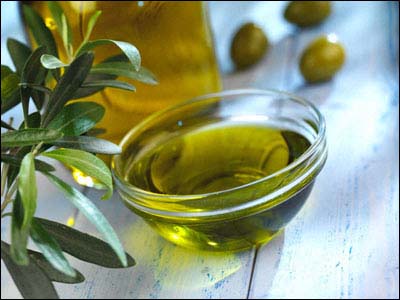
There is an ancient Greek myth that tells us why the city of Athens came to have that name, a tribute to Athena, the goddess of wisdom and justice. Long ago, the city itself had no name, but was still very beautiful and prosperous, and both Poseidon, god of the sea, and Athena, coveted it and wanted to make it their patron city. Zeus declared that the citizens of the metropolis could choose for themselves which divine being they preferred based on the merit of a single respective gift.
Poseidon struck down his trident and out sprung a spring. Unfortunately, the water was as salty and undrinkable as the ocean over which he ruled. Athena threw down her shield, and out of the divot it made in the earth planted an olive tree. From this tree, the people not only got the actual olive, which was very tasty, but the olive's wonderful oil, which could be used to cook and flavor all sorts of things, as well as light lamps in their home. Athena handily won, and to this day, the city retains is divinely attributed moniker.
Olive oil is, and has been for centuries, a staple of the Mediterranean diet. There is an excellent article in this month's Saveur by Nancy Harmon Jenkins about olive oil, from its history to its cultivation and of course, its myriad of uses in the kitchen. As the foundation of much of Greek and Italian cuisine, newborn's lips are often smeared with a little extra-virgin before the first taste of their mother's milk. Talk about a head start in your culinary education!
75% of the world's olives are used to make olive oil, and while the United States was quite late to pick up on its magic, it is now the cornerstone of many people's kitchen. I myself use olive oil constantly when I cook. For fish, for stir-fry, to cook eggs, for my salad, from satueéing vegetables, grilling meat, and braising chicken...basically anything and everything that involves a pan. It has so much more flavor and complexity than butter (while simultaneously enhancing the flavor of the original food that you are cooking). It has gotten to point that I can taste the chemical residue left on food by using PAM or other pan-greasers, including Crisco. Yuck.
Other uses? I like to pour a tablespoon over my pasta and toss after I strain it to keep it from sticking. True Mediterranean households even have family recipes for olive oil cake and cookies, yum. And nothing sets off the flavor of great bread like a little bit of olive oil for dipping.
In addition to all these lovely gastronomical traits, olive oil itself is also ridiculously good for you, perhaps an additional reason for its longevity and relative consistency over the centuries. It does wonders for your skin--so many skin and hair products out there claim to be infused with the olive's essence, and as it is a monounsaturated fat, it does wonders for your cholesterol. Lowering the bad kind while increasing the good. Additionally, it boasts antioxidants called
 polyphenols, which Jenkins says can boost protection against cardiovascular disease, diabetes, some types of cancer, and possibly even Alzheimer's! Not bad for something that I would eat anyway just for the taste.
polyphenols, which Jenkins says can boost protection against cardiovascular disease, diabetes, some types of cancer, and possibly even Alzheimer's! Not bad for something that I would eat anyway just for the taste.How olive oil is made has remained relatively unchanged, but new presses are opening, and whereas oils from places like Spain and California were usually not much to write home about versus the oils from Italy, Greece and Lebanon, things are changing. Great olive oil for the every-day chef can be found in most grocery stores and specialty markets, but if you want to really sample some artisenal stuff, there is a listing of the Saveur team's 10 favorites in the magazine and Saveur.com, but I think an even better place to explore oils is my beloved Zingerman's.
Why Zingermans? Well, for one, they have the buying/shipping of whatever you'd like just a click away. Secondly, they've been doing this for decades and have quite a palate for it, and offer things in a wide variety of price ranges and styles. Rustic and fruity oils from Chile, light oils for baking fish from Italy, oils from Provence, Puglia, Tuscany, California, you name it. All hand-picked. Then, just turn the page or click the neighboring tab to order a lovely loaf of bread with which to eat it!
For the true olive oil aficionado, you can join their "tour de oil" for $95. I got this as a gift for one of my old teachers who loved to cook, and to this day, she professes that it is the best gift she ever got. Perhaps that is a bit of an exaggeration, but it is a gift that keeps on giving: she still orders one of the oils she "discovered" on this little tour.
So, swap out the PAM and the butter and use olive oil in everything and anything that requires a skillet or grill, be it fish, chicken or vegetables. To enjoy a special oil "vintage," slice a baguette, toast it, and while it is still nice and hot, rub it with a clove of cut garlic, and dip or drizzle away!







